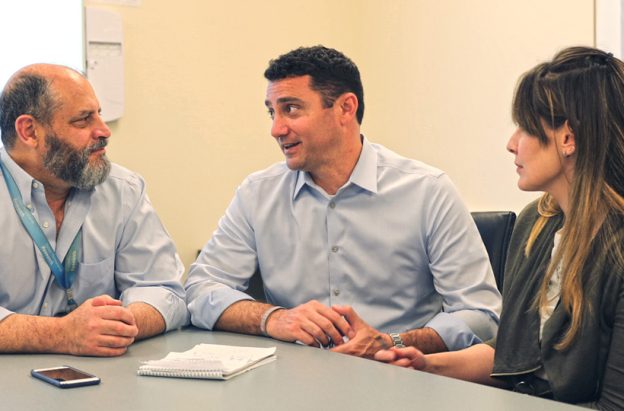
Improving care through research
The Care Improvement Research Team is a groundbreaking partnership in Kaiser Permanente Southern California, bringing researchers and clinicians together to improve health care quality and affordability for Kaiser Permanente members and people throughout the world.
Through CIRT, research scientists team up with frontline clinicians to identify research questions that are important to patients and the doctors who take care of them. CIRT investigators bring rigor and scientific expertise to the process of improving clinical quality, while clinical partners keep the focus on the burning issues of real-world practice.
“So much of medicine is passed down from generation to generation,” said Michael Gould, MD, MS, scientific director of the Department of Research & Evaluation’s Division of Health Services Research & Implementation Science and leader of the Care Improvement Research Team.* “We do things because that’s the way they were done before.”
“I’m very data driven and data oriented, so to me it makes sense that we should use data to find out whether what we’re doing actually works or not,” he added.
Diverse portfolio of relevant research
At any given time, CIRT has about 20 to 25 active projects. Research topics span cancer, COPD (chronic obstructive pulmonary disease), emergency medicine, hospital care, mental health, and more. The common thread is clinical relevance.
Investigators share actionable findings from their research with clinical partners and operational leaders at Kaiser Permanente, who in turn use those findings to improve care. CIRT researchers also share the findings with the rest of the world through publications in medical journals and presentations at scientific conferences.
“Seven years ago, when we founded CIRT, there were virtually no similar programs in other hospitals or health systems around the country,” said Dr. Gould. “The idea of bringing researchers and clinical leaders and administrators together was really novel and groundbreaking.”
CIRT projects have helped to improve care in a variety of ways, from reducing unnecessary antibiotic prescriptions to preventing elderly patients from being readmitted to the hospital. Investigators have helped develop clinical decision tools, implement new models of care, and devise interventions to improve care delivery and health outcomes.
A recent Perspective, published in the Journal of General Internal Medicine, describes CIRT’s success as an embedded research program. The paper identifies key elements of success, including “dedicated funding, robust data systems, and strong relationships between researchers and clinical stakeholders,” as well as a commitment to being responsive to priorities and timelines of the health system.
CIRT has also played an active role in research related to the COVID-19 pandemic. The team recently partnered with the Southern California Permanente Medical Group’s Regional Research Committee to launch a series of rapid-cycle research projects that will help answer questions about prognosis for patients with suspected or confirmed COVID-19.
“We are addressing urgent research questions that inform our frontline clinical partners and the broader scientific community,” said Dr. Gould. “This is really at the core of our mission as researchers embedded within Kaiser Permanente Southern California’s care delivery system.”
*On July 27, Dr. Gould will start a new position with the Kaiser Permanente Bernard J. Tyson School of Medicine as a professor in the Department of Health Systems Science. He will remain an adjunct investigator with the Department of Research & Evaluation, where he continues to lead research studies, including a new study on therapeutics for COVID-19 funded by the Garfield Memorial Fund.





